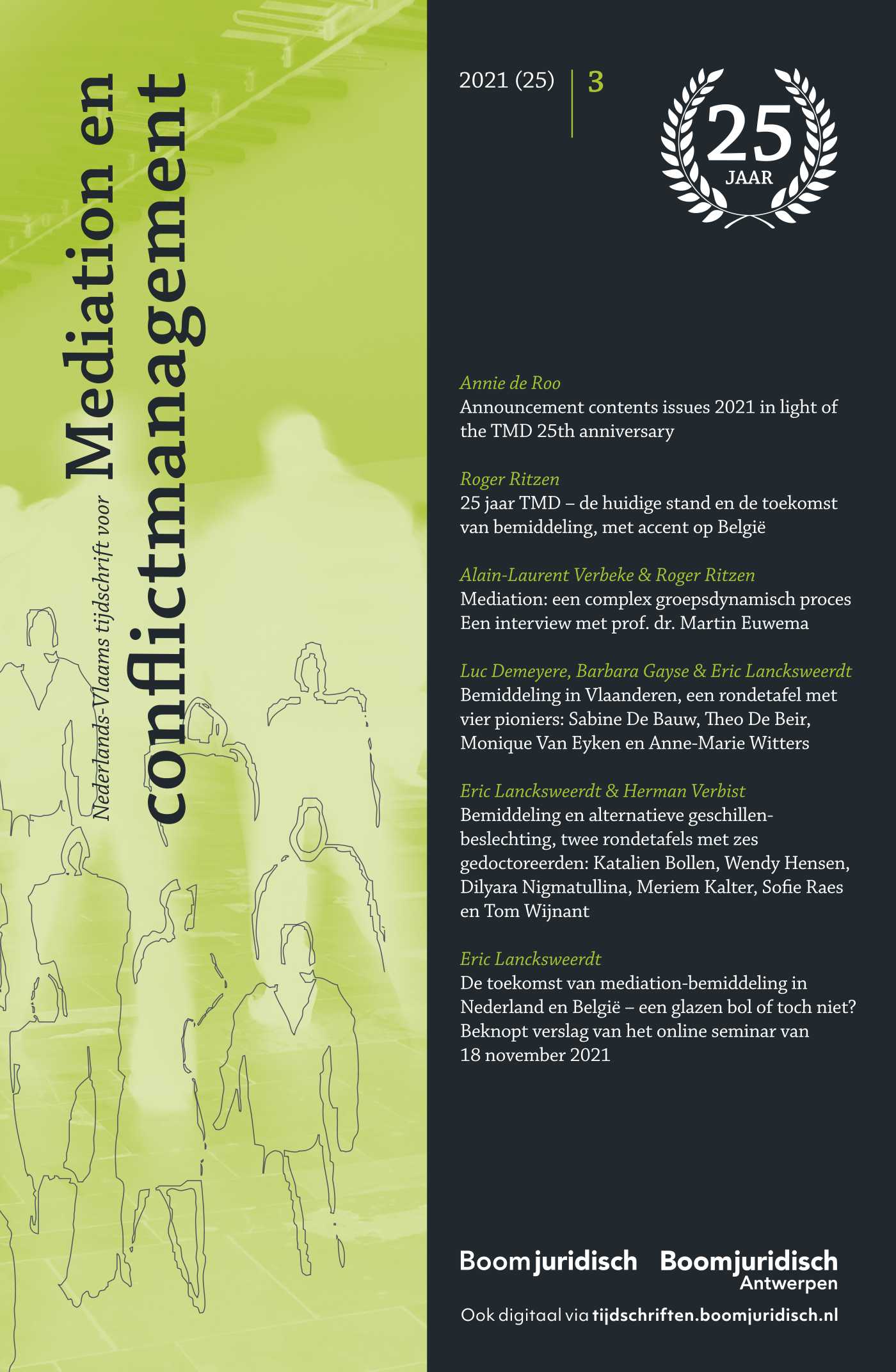|
One branch of legal technology that holds particular promise for non-professionals is developing access to justice through the use of online dispute resolution (‘ODR’). This is because ODR can use technology to enable online claim diagnosis, negotiation, and mediation without the time, money, and stress of traditional court processes. Indeed, courts are now moving traffic ticket, landlord-tenant, personal injury, debt collection, and even divorce claims online. The COVID-19 pandemic has accelerated the growth of online processes, including court and administrative processes that traditionally occurred in person. Nonetheless, these online processes seem focused mainly on case management and communication, neglecting the need for more imaginative and innovative uses of technology. We propose a six-module system for ODR programs and identifies gaps in development where new technologies are needed to advance access to justice. |


Nederlands-Vlaams tijdschrift voor mediation en conflictmanagement
Meer op het gebied van Mediation en herstelrecht
Over dit tijdschriftMeld u zich hier aan voor de attendering op dit tijdschrift zodat u direct een mail ontvangt als er een nieuw digitaal nummer is verschenen en u de artikelen online kunt lezen.
| Redactioneel |
ODR, en de mens achter cyberjustice |
| Auteurs | Annie de Roo |
| Auteursinformatie |
| Artikel |
Online Dispute Resolution – Succes is (on)waarschijnlijk |
| Trefwoorden | Online Dispute Resolution |
| Auteurs | Arno Lodder |
| Auteursinformatie |
| Column |
|
| Auteurs | Jelle van Veenen |
| Auteursinformatie |
| Artikel |
Using artificial intelligence to develop user-friendly Online Dispute Resolution systems |
| Trefwoorden | Online Dispute Resolution, artificial intelligence, access to justice, user centric computing, machine learning |
| Auteurs | John Zeleznikow |
| SamenvattingAuteursinformatie |
| Artikel |
The EU ODR platform – A blessing in disguise |
| Trefwoorden | cODR, consumer Online Dispute Resolution |
| Auteurs | Emma van Gelder en Stefaan Voet |
| SamenvattingAuteursinformatie |
|
When individual consumers are involved in disputes with traders, they increasingly resort to consumer online dispute resolution pathways (cODR) in their search for redress. The field of cODR is quickly developing throughout Europe as an increasing number of cODR providers are entering the field and a growing number of ADR bodies are implementing digital technologies in their procedures.The development of cODR in Europe is and has been significantly influenced and facilitated by the EU legislator, driven by the aim to enhance access to justice for consumers and to strengthen consumer confidence in the internal market. In 2013, the EU legislator adopted the ADR Directive and the ODR Regulation for the purpose of harmonising the field of CDR throughout the EU. Almost a decade has passed since the EU legislative framework on consumer dispute resolution was adopted. The European legislator confirmed the revision of the ADR/ODR regulatory framework in 2023 with the aim to modernize the framework. This paper aims to evaluate the EU ODR platform, to highlight the promising potential of this platform and thereby to argue for its continuation. |
| Artikel |
e-Mediation: de rol van (a)synchrone communicatie |
| Trefwoorden | online mediation, escalatie, asynchroon communiceren |
| Auteurs | Katalien Bollen |
| SamenvattingAuteursinformatie |
|
Although online mediation has been around for a long time, it came into the spotlight again under the influence of Covid and the associated lockdowns. |
| Artikel |
The need for blockchain crowdsourced online dispute resolution (BCODR) |
| Trefwoorden | dispute resolution, blockchain, crowdsourcing, internet law |
| Auteurs | Daniel Dimov |
| SamenvattingAuteursinformatie |
|
This article discusses the problems of the current dispute resolution methods and suggests that there is a need for a paradigm shift in the field of dispute resolution and this shift can come from a new dispute resolution mechanism called Blockchain Crowdsourced Online Dispute Resolution (BCODR). The article examines two contemporary BCODR systems (Kleros and PeopleClaim) in detail and argues that those systems did not become widely used because of their reliance on cryptocurrencies and because their incentive models are based on financial remuneration. In the author’s opinion, for a BCODR to succeed, it needs to accept not only cryptocurrencies, but also fiat currencies and needs to rely on an innovative incentive model that will ensure that the BCODR system is provided either at low cost or at no cost. |
| Artikel |
Bemiddelingsvaardigheden ten dienste van efficiënt en ethisch invorderen van schulden |
| Trefwoorden | gerechtelijke schuldinvordering, gerechtsdeurwaarder, schuldenlast, beslag |
| Auteurs | Alain-Laurent Verbeke |
| SamenvattingAuteursinformatie |
|
Unpaid debts often accumulate with snowball effect, and contribute to an all more increasing poverty trap in our societies. |
| Signalement |
Rechtwijzer: Uit Elkaar |
| Auteurs | Kaoutar Chinig |
| Auteursinformatie |

